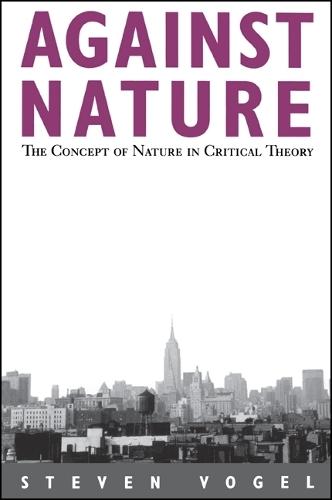Overview
Argues that the tradition of critical theory has had significant problems dealing with the concept of nature and that their solutions require taking seriously the idea of nature as socially constructed.
Full Product Details
Author: Steven Vogel
Publisher: State University of New York Press
Imprint: State University of New York Press
Dimensions:
Width: 15.20cm
, Height: 2.50cm
, Length: 22.90cm
Weight: 0.327kg
ISBN: 9780791430460
ISBN 10: 0791430464
Pages: 225
Publication Date: 03 July 1996
Audience:
College/higher education
,
Professional and scholarly
,
Undergraduate
,
Postgraduate, Research & Scholarly
Replaced By: 9780791430453
Format: Paperback
Publisher's Status: Active
Availability: Out of print, replaced by POD

We will order this item for you from a manufatured on demand supplier.
Reviews
""Vogel's book lies at the intersection of three important fields: Marxist Critical Theory, postempiricist philosophy and sociology of science, and environmental ethics. It is truly excellent. The argument is original and convincing. The project of relating the Western Marxist tradition to contemporary trends in philosophy of science and environmental ethics enriches all three fields.""-Andrew Feenberg, San Diego State University ""This is a stunningly good piece of work on a crucial problem within an influential tradition in twentieth-century philosophy. Vogel's book promises to be the definitive scholarly assessment of the problems and opportunities facing a Critical Theory of nature and science. Vogel sorts out the issues clearly and persuasively, showing how a fundamental, debilitating dilemma recurs throughout the tradition, yet also sympathetically displaying the strengths and accomplishments of each of the major figures, and suggesting a persuasive approach to avoiding the dilemma without abandoning the tradition's most basic commitments. All of the Critical Theorists are notoriously difficult writers, yet Vogel's own prose is a model of how to write philosophy accessibly.""-Joseph Rouse, Wesleyan University ""Vogel's book will immediately become the center of productive debate, since he uses such forceful arguments to slay a number of sacred cows. It will make him a major figure in his field.""-Michael Zimmerman, Tulane University ""In this reader's opinion, this book meets the highest standards of scholarly excellence, argumentative rigor, interpretive originality, and literary accomplishment.""-David Ingram, Loyola University of Chicago
Vogel's book lies at the intersection of three important fields: Marxist Critical Theory, postempiricist philosophy and sociology of science, and environmental ethics. It is truly excellent. The argument is original and convincing. The project of relating the Western Marxist tradition to contemporary trends in philosophy of science and environmental ethics enriches all three fields. -Andrew Feenberg, San Diego State University This is a stunningly good piece of work on a crucial problem within an influential tradition in twentieth-century philosophy. Vogel's book promises to be the definitive scholarly assessment of the problems and opportunities facing a Critical Theory of nature and science. Vogel sorts out the issues clearly and persuasively, showing how a fundamental, debilitating dilemma recurs throughout the tradition, yet also sympathetically displaying the strengths and accomplishments of each of the major figures, and suggesting a persuasive approach to avoiding the dilemma without abandoning the tradition's most basic commitments. All of the Critical Theorists are notoriously difficult writers, yet Vogel's own prose is a model of how to write philosophy accessibly. -Joseph Rouse, Wesleyan University Vogel's book will immediately become the center of productive debate, since he uses such forceful arguments to slay a number of sacred cows. It will make him a major figure in his field. -Michael Zimmerman, Tulane University In this reader's opinion, this book meets the highest standards of scholarly excellence, argumentative rigor, interpretive originality, and literary accomplishment. -David Ingram, Loyola University of Chicago
Author Information
Steven Vogel is Professor of Philosophy at Denison University.



